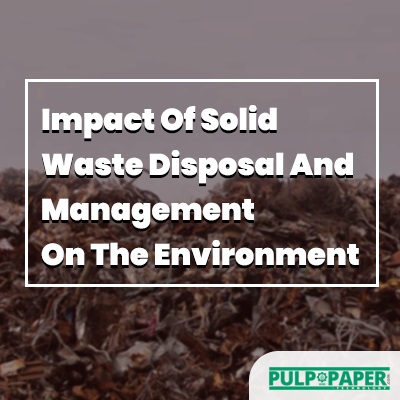Impact Of Solid Waste Disposal And Management On The Environment

One of the major environmental problems that developing countries are facing is improper solid waste disposal and management strategies. Ever since the industrial revolution, solid waste has been a major environmental issue. Besides the waste, we generate at school, home, market, and other public places, they are also those from industries, farms, hospitals, pharmaceuticals, and other sources. While some of the garbage, refuse, sludge, trash, and rubbish are biodegradable e.g., paper products, food droppings, as well as vegetation like grass and twigs, and others are not biodegradable and they include metals, aluminum cans, plastics, broken computers, and car parts. As they do not decay easily, they pile up in landfills and refuse dumps and these bring great harm to the water, land, and people around it. The lack of efficient waste management practices leads to health hazards, unsightliness, traffic congestion, blockage of drainages, and unpleasantness. The solid wastes could be defined as non-gaseous and non-liquid products of human activities, considered as being useless. Improved waste management and a sustainable environment offers opportunities for health improvements, income generation, and reduced vulnerability. The problems of waste disposal are becoming complex as population and industrial production increase and hence waste generation has also increased. Due to the rapid growth of the population, solid waste management has become particularly difficult today.
Solid Waste Disposal On Environment
A common source of local environmental pollution is the decomposition of waste into constituent chemicals. Environmental standards are met by very few existing landfills in the world's poorest countries and with limited budgets, they are likely to be few sites rigorously evaluated before use in the future. The gas released by decomposing garbage is a major environmental concern. Methane, the by-product of the anaerobic respiration of bacteria, and these bacteria thrive in landfills with high amounts of moisture. At maximum anaerobic decomposition, the methane concentration can reach up to 50% of the composition of landfill gas.
Another problem associated with these gases is their contribution to the enhanced climate change and greenhouse gas effect. There is a variation of the liquid leachate management throughout the landfills of the developing world. A threat is posed by the leachate to local surface and groundwater systems. The optimum strategy to contain excess liquid is the use of dense clay deposits at the bottom of waste pits, coupled with plastic sheeting-type liners to avoid infiltration into the surrounding soil. So, in this way, the waste rather than infiltration is encouraged to evaporate.
| Also Read: Innovations in Sustainable Waste Management: Paving a Greener Future |
Preventive Measures For Reduction Of Adverse Impact On Human And Environment
To ensure that it does not affect the environment and not cause health hazards to the people living there, proper solid waste management has to be undertaken. Proper segregation of waste has to be done at the household-level and it should be ensured that all the organic matter is kept aside for composting. Undoubtedly, this is the best method for the correct disposal of this segment of the waste. The organic waste can be composted and then used as a fertilizer. These steps may be taken for the prevention of impact on environment and human.
- Waste generation should be decreased.
- Promoting the production of goods that minimize waste generation after use.
- Material recycling and recovery should be increased.
- Promoting the usage of plastic recycling.
- Identification labels and codes to make recycling and sorting of plastic packaging easier.
- Municipalities should increase their level of service to the public regarding the sorting of waste.
- Promoting the use of less hazardous alternatives to hazardous chemicals during the production of goods.
- Legislation in the waste sector should be improved
- Collection of hazardous waste at collection points shall be secure, safe and performed in an environmentally sound manner.









